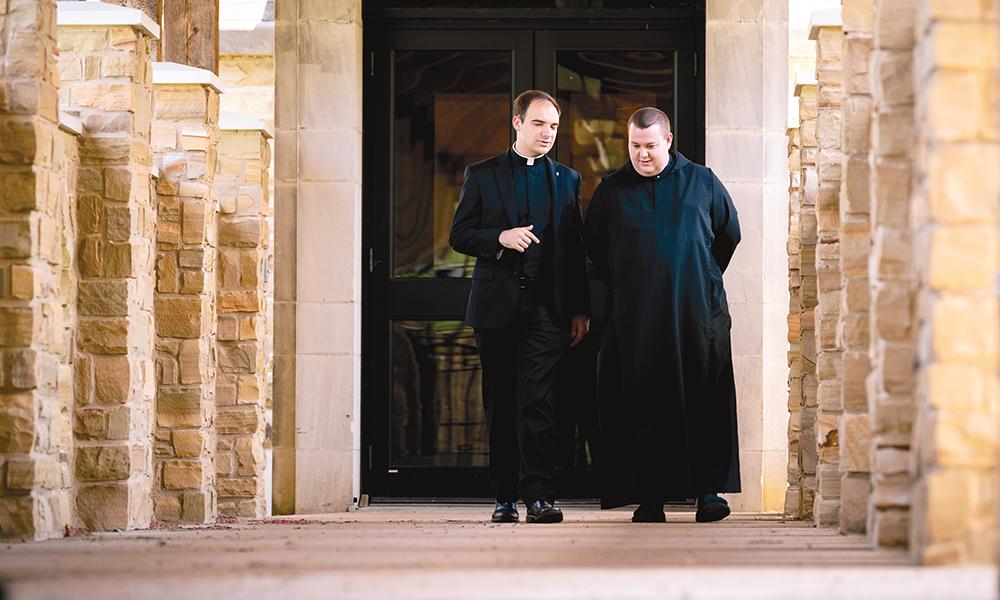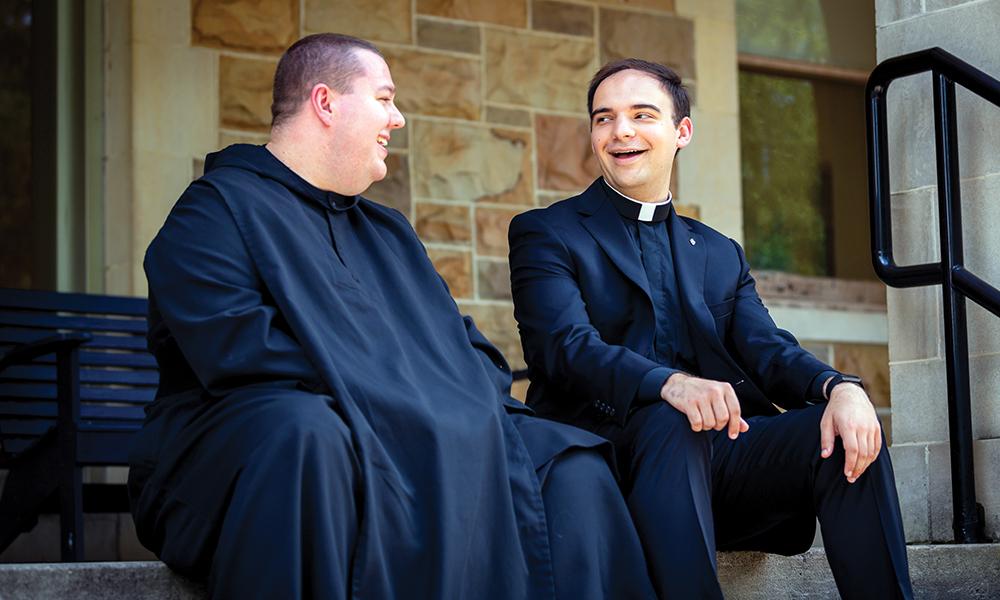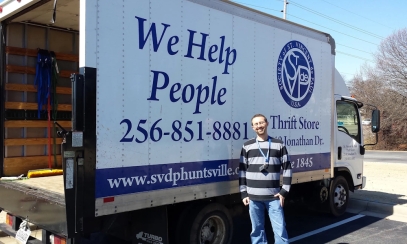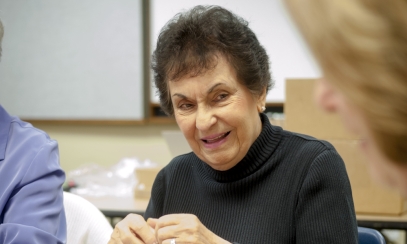
Two men, two paths, one call
A providential friendship
A providential friendship
When it comes to discerning one’s vocation, Brother Paschal Pautler, O.S.B., a monk-deacon of St. Bernard Abbey in Cullman, avows that the Lord, in His love, “provides the path for us.” This truth is exemplified not only by his own journey, but also by that of his best friend, Deacon Daniel Sessions, a diocesan seminarian. From two little kindergarteners playing Mass during recess to a duo on the cusp of being ordained to the priesthood, the two have steadily journeyed, oftentimes in a parallel fashion. Both products of devout Catholic families and Catholic education, the two friends have been blessed with the ability to clearly see their paths — paths blazed by the Lord.
When it comes to discerning one’s vocation, Brother Paschal Pautler, O.S.B., a monk-deacon of St. Bernard Abbey in Cullman, avows that the Lord, in His love, “provides the path for us.” This truth is exemplified not only by his own journey, but also by that of his best friend, Deacon Daniel Sessions, a diocesan seminarian. From two little kindergarteners playing Mass during recess to a duo on the cusp of being ordained to the priesthood, the two have steadily journeyed, oftentimes in a parallel fashion. Both products of devout Catholic families and Catholic education, the two friends have been blessed with the ability to clearly see their paths — paths blazed by the Lord.
Brother Paschal Pautler, O.S.B.
The first leg of the brother’s journey seemed to set the stage for his vocation. When he was born, his mother was an employee at the Cathedral of St. Paul in Birmingham. Then pastor Father Patrick Cullen welcomed the new addition with open arms, allowing the newborn to accompany his mother to work. “God bless Father Cullen,” says Brother with a smile. “I was literally raised in the cathedral.” Of course, the day came for him to start school. His parents enrolled him at St. Rose Academy, also in Birmingham, which would ultimately play an integral role in their son’s vocation.
The Dominican Sisters of St. Cecilia, more commonly known as the Nashville Dominicans, govern the tiny school atop Red Mountain. As would be expected, the sisters don’t shy away from fostering an openness to priesthood or religious life. However, it isn’t forced; rather, it occurs naturally. It is in the sisters’ joy, their words of encouragement, and their living witness.
The environment served as fertile soil. “I wouldn’t have been able to tell you as a child,” explains Brother Paschal, “but from the time I was little at St. Rose, there was something that drew me to the sisters and the habit. I realized they were happy people, and I knew instinctively that there was something different about them.”
The school was, in essence, a first seminary. With the word meaning “seed ground,” Brother feels that St. Rose served as such ground. “They germinated the vocation in our souls, and that is not an insignificant thing.”
When the time came for Brother to start high school, the attraction he unconsciously had from a young age to the sisters’ happiness made St. Bernard Preparatory School in Cullman the next logical step.
For Brother Paschal, there was an almost instantaneous connection with St. Bernard. “Immediately, I just fell in love with the place,” he recalls. What he noticed in the sisters at St. Rose, he also saw in the monks at St. Bernard. “I got to know the monks because they were teaching me in school, and as I got to know them better, I realized that these men were happy men. They have something figured out which the rest of the world doesn’t.” That revelation created a yearning to obtain the same happiness.
Over time, Brother was invited to choir and joined in prayers several times a week. He would even go to supper with the monks, which introduced him to the monastic life little by little. As his interaction with the monks continued, he came to realize that he “needed” community and the support it offers to one’s spiritual life. Quoting Benedictine Father Joel Martin, the brother pointed out, “As monks, we go to God as brothers.” Three weeks after his high school graduation, he entered the monastery. “In my 18 years outside the monastery,” he professes, “something was missing because I was made for this. I’ve always felt like I am who I am in the monastery.”
Deacon Daniel Sessions
Ironically, Deacon Session’s mother was also employed in service to the Church when he was a youngster. Like Brother’s parents, the deacon’s parents also made the decision to send their son to St. Rose Academy when the time came for kindergarten.
As can be imagined, the two became fast friends as 5-year-olds, playing benediction during recess and letting their teacher dress them up in clerical garb. Of course, the young deacon, like his best friend, was drawn to the sisters’ infectious joy, yet he was also positively influenced by the regular presence of priests, especially diocesan priests, at the school’s weekly celebration of the Mass.
Meeting the many priests, who were “very different,” from Father Andy Kennedy to Father Kevin Bazzel, they all played a large part in the deacon “discovering God’s plan” because their “very lives” pointed the way. From a young age, the deacon found a diocesan priest’s way of life compelling. “I have very specific memories with very specific diocesan priests in my life. Those stood out and they still stand out,” he explains. “I remember Father Pat O’Donoghue from Holy Infant near where my dad’s office was and meeting him for the very first time in the old Holy Infant Church. I remember serving Mass with Father Matthew Brennan the day after my First Communion. And, of course, I remember my pastor for a large part of my childhood, Father Jim Naughton, who was a Salesian of Don Bosco serving in a diocesan parish.”
As high school approached, it became clear that Deacon Sessions was not going to accompany his friend to St. Bernard Prep. Instead, the deacon enrolled at John Carroll Catholic High School, allowing him to continue interacting with diocesan priests as well as his pastor, Father Jim. It was through his interaction with Father Jim, the young deacon “got to know the mission of what a pastor does, what a parish priest does, and who a parish priest is and how a parish priest lives, even on the most fundamental level of his existence: being the priest victim that Christ is.”
During his junior year, the deacon started meeting with Father John McDonald, then president of John Carroll Catholic, who ultimately became his spiritual director. The meetings helped Deacon Sessions deepen his faith, but it also helped him take the next step on his journey. “I remember meeting with him about the diocesan lifestyle versus religious life, and I wanted him to tell me, ‘You will be good for this.’ I was frustrated that he wasn’t telling me at the time,” remembers the deacon.
Looking back, though, he realizes that the priest was exercising great wisdom. “Ultimately, in a vocation,” says the deacon, “you have to take a leap of faith based only on the trust that you have in God. You can have all these factors that indicate where the Lord is leading you, but ultimately you have to make that decision based on faith. If it is based on what someone else is telling you — if it is based on what this priest thinks you should do — then it’s not a decision that you’re making based on what God wants. It’s always going to be less because you’re not really opening yourself up to what God wants … you’re really basing it on the authority of man and not of God.”
The high school senior took that leap of faith and decided he wanted to become a seminarian for the Diocese of Birmingham. Right before entering seminary, Deacon Sessions met with his childhood pastor several days before his death. The entire parish knew he was very ill, so the deacon wanted to meet one last time. During this meeting, the priest, who had served as an inspiration, gave the young Sessions his chalice.
Reflecting on the gift, for the deacon, the gift is symbolic of Father Jim’s participation in the outpouring of “Christ’s blood and the redemptive salvific blood that comes from the side of Christ.” He believes that having the chalice and, God willing, getting to celebrate Mass using it is a continuation of his mentor’s same mission. “Priesthood in Birmingham,” the deacon points out, “existed way before me and it will exist long after me. I am given a share of the mission in a certain way, so this vocation is understanding and cooperating with the redemptive mission that God has for me and for His people. That is a beautiful thing!”
As a young man who has virtually grown up in seminary, Deacon Sessions strongly believes the time in seminary and the formation that occurs over the years helps the seminarian take on the “priestly heart.” The deacon believes his summer assignments played a significant role. “You learn things about yourself that indicate a path forward.” From having three hospital calls in a 24-hour period to listening to the assigned pastors, the experiences help mold men in formation. “Not only do you learn from the pastor how to be a good pastor,” clarifies Sessions, “but then you also learn to love the people that God has placed in front of you. ... We are sent to a certain group of people within a certain geography to minister and to be on mission in the most radical way possible, which is to give your life to God so that He can give your life to the people in the way that He wants.”
Providence
Speaking on hearing the call to a life of service to the Lord, the two agree that a vocation is not an accident. Having families open to vocations, an elementary school led by religious sisters, a place to journey together, and a high school experience which further solidified their hearts’ desire were not coincidental. “These were the things that God has planned since eternity,” attests Brother Paschal.
Likewise, both are well aware that their friendship has undoubtedly been God’s providence. The same upbringing has brought about two different perspectives, but ones that aid each other on their own journey. In many ways their friendship parallels the long-standing relationship between the Diocese of Birmingham and St. Bernard Abbey. “I am so grateful to Daniel for the apostolic mission that he has accepted because it is a witness to me. … When I think of Daniel, I think of courageous, forward, strong, and charismatic, and that is exactly what the Church needs out there,” says Brother Paschal. For Deacon Sessions, his Benedictine friend is a reminder of how every diocesan priest needs to live: a life lived in a very devoted way. Brother Paschal serves as a reminder for the deacon to have “an appropriate care and concern for the things of God.”
As the two prepare for ordination, the happiness they saw in the Dominican sisters of their youth is now a gift which can be seen in them. For Brother Paschal, his happiness is rooted in being loved and being able to love. “I feel God’s love is made known to me here at St. Bernard. … It’s not so much that God needs you, but God has chosen you in His divine will for this specific purpose. Because God has chosen you to be who you are, you need that vocation for your own salvation, your own happiness.”
Deacon Sessions’ happiness is rooted in the same security of knowing he is where God has put him. “That happiness,” insists Deacon Sessions, “you can’t create.”
While that true happiness can’t be created, it most certainly can be attained, and Brother Paschal’s advice is surprisingly direct. Simply, we need to teach the faithful how to listen to the voice of God and how to recognize it and understand it. Then, he says, all we need to do is “get out of the way” and let God’s plan unfold.
Ordination to the priesthood
Deacon Daniel Sessions will be ordained to the priesthood at the Cathedral of St. Paul on Saturday, June 24. The Mass will begin at 11 a.m. Brother Paschal Pautler, O.S.B., will be ordained to the priesthood at St. Bernard Abbey on Saturday, June 10. The Mass will begin at 10:30 a.m. All are welcome to celebrate with both men. The cathedral is located at 2120 3rd Avenue, North in downtown Birmingham, and St. Bernard Abbey is located at 1600 St. Bernard Drive, Southeast in Cullman.




